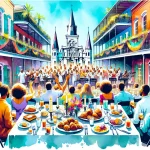New Orleans, the birthplace of jazz, pulsates with the rhythm of music. From the bustling French Quarter streets to the vibrant neighborhoods beyond, music stores dot the landscape, offering a melodic treasure trove for locals and travelers. These establishments transcend mere retail spaces; they are cultural hubs preserving and celebrating the city’s rich musical heritage.
In This Article
TL;DR
- The diverse music stores in New Orleans cater to varied tastes, from vintage vinyl collectors to aspiring musicians seeking instruments and lessons.
- These stores play a vital role in upholding the cultural heritage by promoting local artists, hosting live performances, and serving as gathering places for music enthusiasts.
- Exploring New Orleans’ music stores offers travelers an immersive experience, providing insights into the city’s musical soul and opportunities to uncover hidden gems.
Historical Context of Music Stores in New Orleans
New Orleans’ music scene has evolved over centuries, giving birth to genres like jazz, blues, and zydeco. Music stores have been integral to this evolution, nurturing emerging talents and serving as repositories of musical knowledge.
One of the earliest and iconic music stores was Werlein’s, established in 1832. This store played a pivotal role in the development of jazz, providing instruments and sheet music to early pioneers. Other notable historical stores include Grunewald’s Music House, opened in 1853 and a hub for classical and opera enthusiasts.
These establishments did more than sell instruments and music; they fostered a sense of community, hosting performances and serving as gathering places for musicians and music lovers.
Current Landscape of Music Stores
Today, New Orleans boasts a variety of music stores catering to various genres and interests. From the bustling French Quarter to the eclectic Uptown and Bywater neighborhoods, these stores offer a unique glimpse into the city’s vibrant musical tapestry.
Magazine Street, a lively commercial corridor, is home to several notable music stores, including Peaches Records, a sprawling emporium offering an extensive vinyl, CD, and music memorabilia selection. The Frenchmen Street area, known for its lively music scene, houses stores like Euclid Records, a funky haven for punk, rock, and alternative music enthusiasts.
Beyond economic contributions, these stores serve as cultural hubs, hosting in-store performances, album release parties, and music-related events that bring the community together.
Detailed Profiles of Top Music Stores
Louisiana Music Factory
Situated in the heart of the French Quarter, the Louisiana Music Factory is a true institution for music lovers. Established in 1992, this store boasts an impressive jazz, blues, and zydeco collection, many recordings being rare and hard-to-find. Beyond its extensive offerings, the Louisiana Music Factory hosts free live performances throughout the year, providing a platform for local and touring artists.
One unique feature is its “Listening Lounge,” where customers can sample albums before purchase. The knowledgeable staff is always on hand to offer recommendations and insights into the city’s musical history.
Address: 210 Decatur St, New Orleans, LA 70130
Phone: (504) 586-1094
Hours: Monday-Thursday 10AM-8PM, Friday-Saturday 10AM-9PM, Sunday 11AM-6PM
Peaches Records
Peaches Records is a true gem in the heart of Uptown New Orleans. This massive store, housed in a former grocery market, is a vinyl enthusiast’s and music collector’s paradise. With an extensive selection spanning rock, pop, jazz, and blues, Peaches Records offers a treasure trove of rare and out-of-print albums.
Beyond its impressive music collection, Peaches Records is also a hub for music-related merchandise, including t-shirts, posters, and other memorabilia. The store frequently hosts in-store performances and album release parties, fostering a sense of community among music lovers.
Address: 4318 Magazine St, New Orleans, LA 70115
Phone: (504) 897-4800
Hours: Monday-Saturday 11AM-7PM, Sunday 12PM-6PM
Euclid Records
Situated in the vibrant Bywater neighborhood, Euclid Records is a haven for alternative music enthusiasts. This funky store offers a carefully curated selection of punk, indie, and experimental music, as well as a wide range of vinyl records.
What sets Euclid Records apart is its commitment to supporting local artists. The store frequently hosts in-store performances and art exhibitions, providing a platform for emerging talents. Additionally, Euclid Records offers music lessons and instrument repairs, making it a one-stop shop for musicians and music lovers.
Address: 3401 Chartres St, New Orleans, LA 70117
Phone: (504) 267-7536
Hours: Monday-Saturday 11AM-7PM, Sunday 12PM-6PM
Cultural Significance of Music Stores
Music stores in New Orleans play a vital role in preserving and promoting the city’s musical heritage. These establishments serve as repositories of cultural knowledge, housing rare recordings and artifacts that document the evolution of genres like jazz, blues, and zydeco.
Beyond physical offerings, music stores foster a sense of community and cultural exchange. Local musicians often gather at these stores to share stories, exchange ideas, and forge collaborations. In-store performances and events provide opportunities for emerging artists to connect with audiences and gain exposure.
Festivals like the New Orleans Jazz & Heritage Festival and the French Quarter Festival often feature music store-related events, solidifying the cultural significance of these establishments.
Traveler’s Guide to Visiting Music Stores
For travelers seeking an authentic New Orleans experience, visiting the city’s music stores is a must. Here are some tips to make the most of your explorations:
- Respect the etiquette: Many music stores are small, intimate spaces. Be mindful of volume and avoid disrupting other customers or in-store performances.
- Engage with the staff: The knowledgeable staff can provide invaluable insights into the local scene, recommend hidden gems, and share stories about the city’s musical history.
- Attend in-store events: Check the store’s calendar for upcoming performances, album releases, or other events. These provide a unique opportunity to experience the city’s musical culture firsthand.
- Combine with nearby attractions: Many stores are located in vibrant neighborhoods like the French Quarter, Frenchmen Street, and Magazine Street. Combine store visits with exploring nearby attractions, restaurants, and bars for a well-rounded experience.
Impact of Music Stores on Local Artists and the Community
Music stores in New Orleans play a crucial role in supporting local artists and fostering a vibrant music community. These establishments often serve as launching pads for emerging talents, providing platforms for exposure and opportunities to connect with audiences.
Many stores collaborate with local artists to host in-store performances, album releases, and workshops. These events promote the artists and create a sense of community and cultural exchange.
Additionally, music stores often sponsor local music festivals, concerts, and events, further supporting the city’s thriving scene. Some stores even offer recording facilities or music lessons, nurturing the next generation of New Orleans musicians.
Local artists frequently cite the importance of music stores in their careers, crediting these establishments for providing a supportive environment and opportunities to connect with fans and fellow musicians.
Future Trends and Innovations in Music Stores
As the music industry evolves, New Orleans’ music stores are adapting to stay relevant and engaging. Emerging trends and technological advancements are being integrated into these establishments, offering new and innovative ways for music lovers to experience and engage with music.
Virtual reality experiences are becoming increasingly popular, allowing customers to immerse themselves in virtual concerts or explore digital music archives. Some stores are also embracing online catalogs and streaming services, providing customers with convenient access to a vast array of music.
Additionally, music stores are exploring new ways to foster community engagement, such as hosting live-streamed performances, virtual music lessons, and online forums for music enthusiasts to connect and share their passion.
As New Orleans continues to embrace its musical heritage, these innovative approaches will ensure that music stores remain vibrant cultural hubs, preserving the city’s musical legacy while adapting to the changing landscape of the industry.






